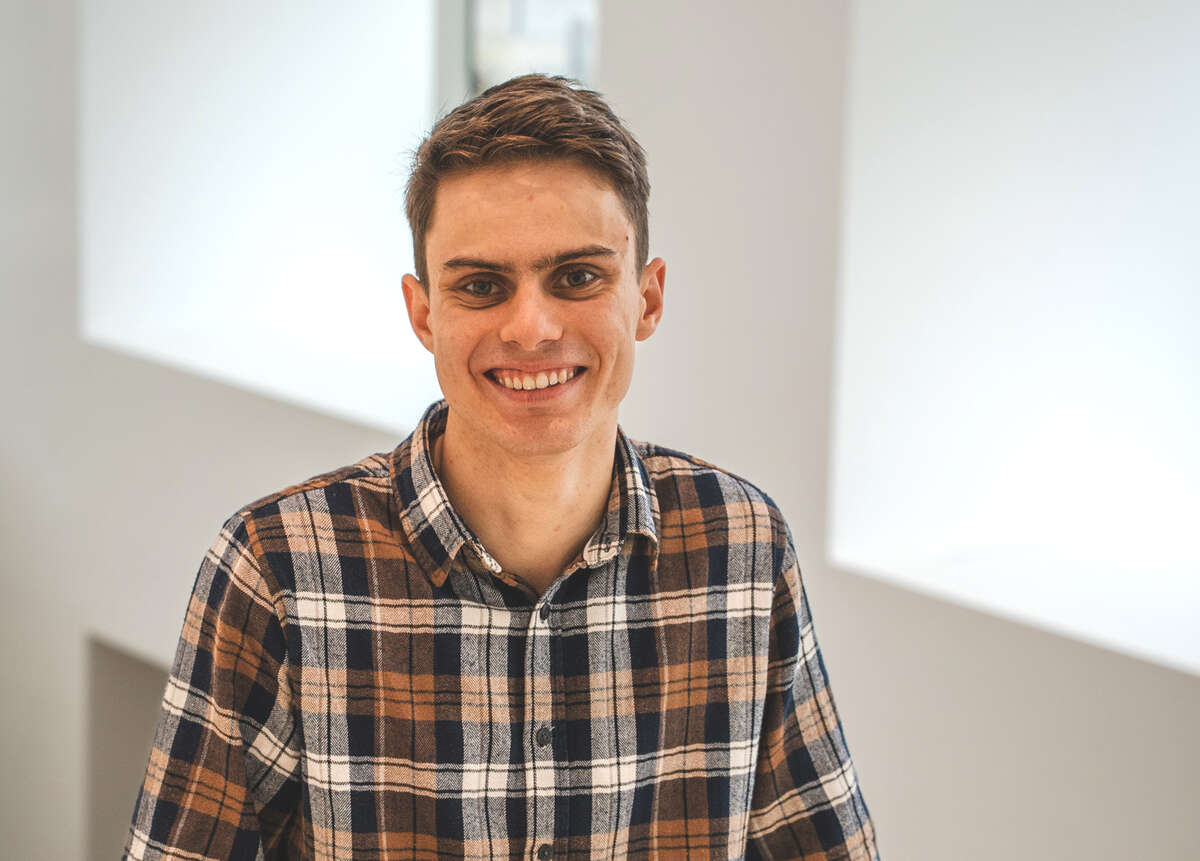Sebastian Bolli: «You learn the most by making mistakes»
Already involved in hands-on research as a bachelor’s student: Sebastian Bolli explains why the EMB course has become perhaps the most formative experience of his studies — featuring fluorescent bacteria, teamwork in the lab, and the freedom to treat mistakes as learning opportunities.

Sebastian, you study molecular biology. Why did you choose this field?
I am currently in my third semester studying Molecular Biology at the Biozentrum of the University of Basel. For a long time, I was unsure whether I should study at ETH Zurich or in Basel, and I also went back and forth between biology and medicine. In the end, I chose the Biozentrum because I was convinced by the strong research environment, the proximity to the pharmaceutical industry, and the solid structure of the program, which provides broad foundations in chemistry, mathematics, and physics.
What makes Basel an attractive place to study?
The close network between the university and various institutions, such as the Swiss Tropical and Public Health Institute, as well as its strong links to the pharmaceutical industry, make the University of Basel extremely appealing for studying life sciences. As a student, you are actively involved in cutting-edge research. Basel is also considered a major hub for innovation in chemistry and biotech. Nowhere in Europe is the density of biotech start-ups and spin-offs higher than here.
How did the start of your studies feel? Surprising or as expected?
The start of my studies went well. The pace at which material was taught was fast. You definitely had to sit down, stay focused, and study consistently so you wouldn’t fall behind. But it wasn’t particularly surprising, as I expected a demanding environment that also offers many opportunities. What was great, though, was meeting so many new fellow students, which is especially helpful when preparing for exams in small study groups.
What makes the Experimental Molecular Biology (EMB) course so special?
The EMB course focuses on learning essential practical skills that are used daily in cell and molecular biology. Compared to theoretical lectures, the EMB course gives you an active, in-depth look into cell and molecular biology. You learn fundamental techniques ranging from PCR and Sanger sequencing to CRISPR-Cas9 gene editing. We don’t simply reproduce well-known experiments, which makes the course extremely exciting. In a way, we are right at the forefront of research.
Which aspects of the EMB course did you enjoy the most?
In general, most of the techniques are very fascinating. What I enjoyed most was working with specially modified E. coli bacterial strains into which we inserted a specifically modified DNA strand containing the sequence for our target protein. The goal is to use the bacterium as a “biological factory” for our protein in order to produce larger quantities of the DNA sequence encoding it. We also tagged the protein with a fluorescent protein, the so-called Green Fluorescent Protein (GFP). This allowed us to track exactly where in the cell the protein was being expressed using UV microscopy.
Research is teamwork. How does collaboration work in the lab?
Collaboration is smooth, and the atmosphere in the lab is very collegial. It’s a great learning environment. Dr. Dominik Buser supports us like a sports coach and teaches specifically for the experiments. Whenever it makes sense, students collaborate, results are compared and discussed intensively. Together with the theoretical background from lectures, many puzzle pieces come together in these conversations, and you start to understand connections in a completely new way.
Is there an experience from the course that has particularly stayed with you?
One of the great things about the course is that, just like in real research, an experiment can go completely wrong. I believe you learn the most by making mistakes, especially in a field as complex as molecular biology. In research, a small mistake can easily ruin a month or more of work, but in the course, thanks to many backups, you don’t have to be too nervous.
And outside the lab: What is student life in Basel like for you?
Student life at the University of Basel is largely based on voluntary participation. It requires initiative but is supported by a wide range of sports activities. Compared to my friends in Cambridge and Oxford, the University of Basel offers fewer organized leisure activities. But that doesn’t bother me, quite the opposite, it allows students to organize activities among themselves.


